Discussions in the humanities – from philosophy and religion, to history and politics – guide our most crucial decisions, on a global scale and in very personal ways. They determine our understanding of ourselves and others, and how our communities build relationships and make progress. They shape our worlds.
But over recent decades, false narratives have accumulated around the humanities. Many, for example, perceive the study of humanities as a side item, an afterthought, or a luxury in undergraduate education.
Students hear that career readiness comes from pursuing a major of the moment – whatever is most in demand at the time. Universities serving first-generation and minority students receive particular pressure to funnel students toward professional or STEM fields, regardless of interest, in order to launch careers.
However, studies of career readiness tell a different story.
The National Association of Colleges and Employers has found that critical reasoning, collaboration, and communication are the skills that are the most sought after by employers, with 75 percent of employers rating them in their top three desired skills. They are also the skills that frequently help senior professionals carve pathways to leadership positions. UNC Greensboro’s researchers call them “the three Cs.” These skills, they say, are best developed through humanities courses.
With that knowledge, UNCG is on the road to changing how the humanities are perceived, in a big way. The University is re-envisioning the role of humanities in undergraduate education and, in the process, doubling down on its commitment to student outcomes.
Currently at UNCG, undergraduate research experiences are being integrated into a multitude of humanities courses and projects, along with career preparation and professional development components. Last year, the University received a $200,000 grant from The Andrew W. Mellon Foundation to support those activities.
The program is designed to offer new funded research opportunities for faculty, while improving outcomes for underserved students. The impact will reach beyond the confines of campus – not only through community-engaged research, but through the development of the next generation of active, concerned citizens dedicated to serving and improving their respective communities.
Overhaul. UNCG faculty have redesigned 42 courses in 13 different subject areas for undergraduate research skill development, which will impact 1,200 students in the fall semester.
Courses range from “Write for your Life! Reading and Writing Diverse Lives” to “The Emergence of Capitalism from the Atlantic World.”
TRANSFORMATION
Opportunities for research with a faculty mentor strongly correlate to undergraduate academic achievement and positive post-graduate outcomes, such as advancing to graduate school or entering a satisfying career, says Dr. Joanne Murphy.
The associate professor of classical studies and Undergraduate Research, Scholarship, and Creativity faculty fellow serves as principal investigator for the Mellon grant, and she has seen for herself how research experience transforms students.
“There are so many impacts of undergraduate research,” she says, “but what I love the most is the confidence. Students become an authority on a thing, and they are more confident when they speak to you, and more articulate in the way they speak. They also have the confidence to know where they can find answers – they can pull arguments together and present their material.”
Since 2009, she has guided UNCG students through six-week professional internships at an archaeological field school on the Greek island of Kea. She also scaffolds research skill development into her classes on the ancient world at UNCG.
She finds that students who have opportunities to engage in research develop the confidence not only to share what they know but also to ask questions about what they don’t know – and to seek knowledge on their own.
“That’s what employers want,” she says. “People who are self-motivated and look for their own answers.”
Dr. Lee Phillips, the director of the Undergraduate Research, Scholarship, and Creativity Office, or URSCO, agrees.
“Collect information. Synthesize information. Communicate information. If a student can do those things,” says Phillips, “they will be successful in college, after college, and in their professional life.”
He says the opportunity to develop a research process – to know how to conduct research and discover knowledge – leads a student to success.
“We begin to see information and knowledge differently. We realize that knowledge is not stagnant, but an ever-changing state, and something we all contribute to.”
Phillips understands undergraduate research as a high-impact practice that not only enriches the path of individual students, but also enriches communities, both non-academic and academic.
“When a student feels they contribute to a discipline, they have a greater affinity for it and tend to stick with it longer. Expanding access to undergraduate scholarship in a field will expand the demographics of that field.”
The engagement of traditionally underrepresented students in research not only improves their academic and professional paths but also ensures those fields of study – and the ways we understand our world – are driven by a diverse set of scholars.
“Diversity,” says Murphy, “keeps disciplines relevant.”
Research Opportunity. Eight Mellon-funded student and faculty research projects are already underway and include 22 faculty members and 23 undergraduate students.
Topics range from visualizing voter data to a global study of memory and landscape, civil rights history, and the boundaries of free speech.
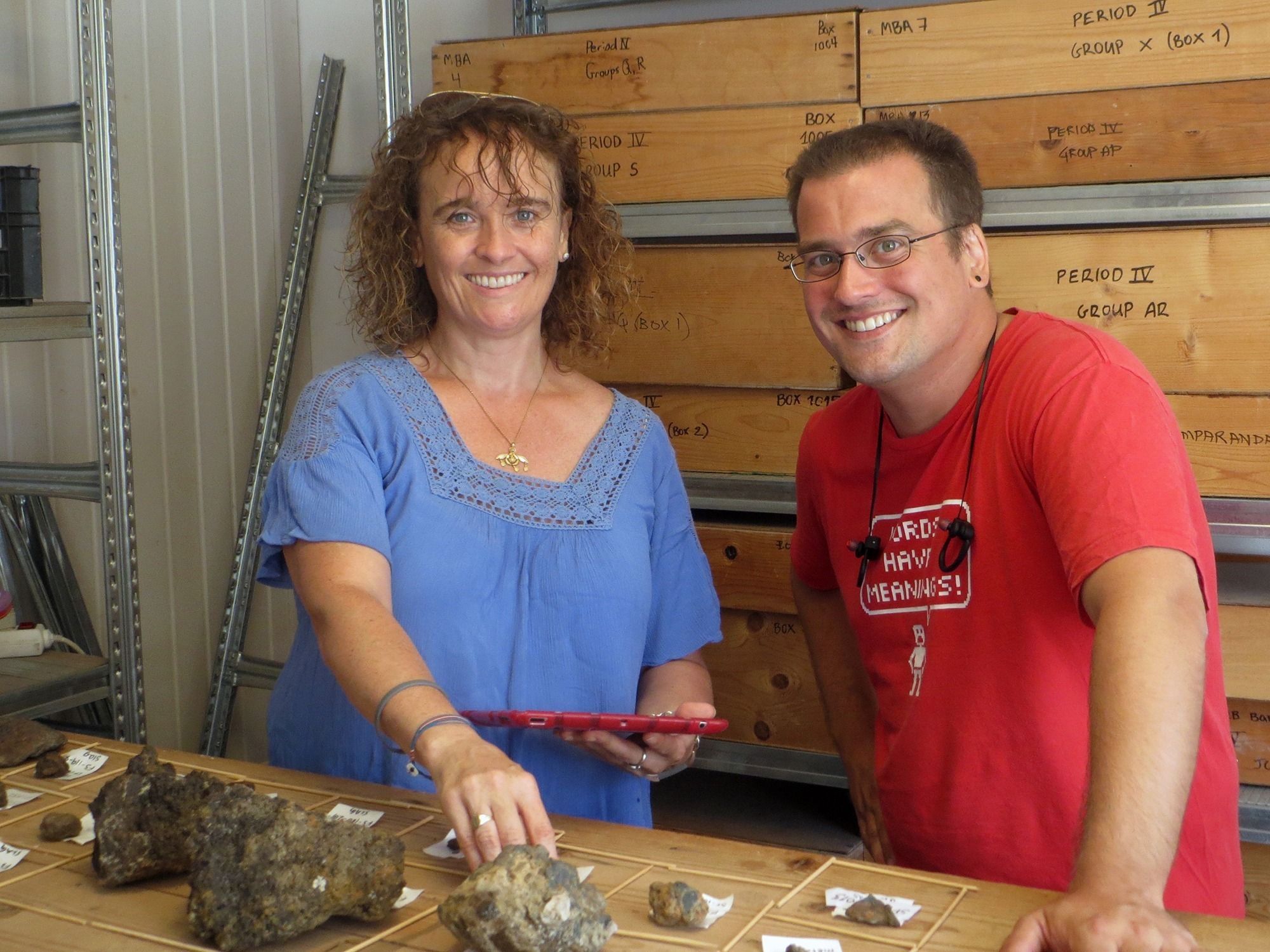
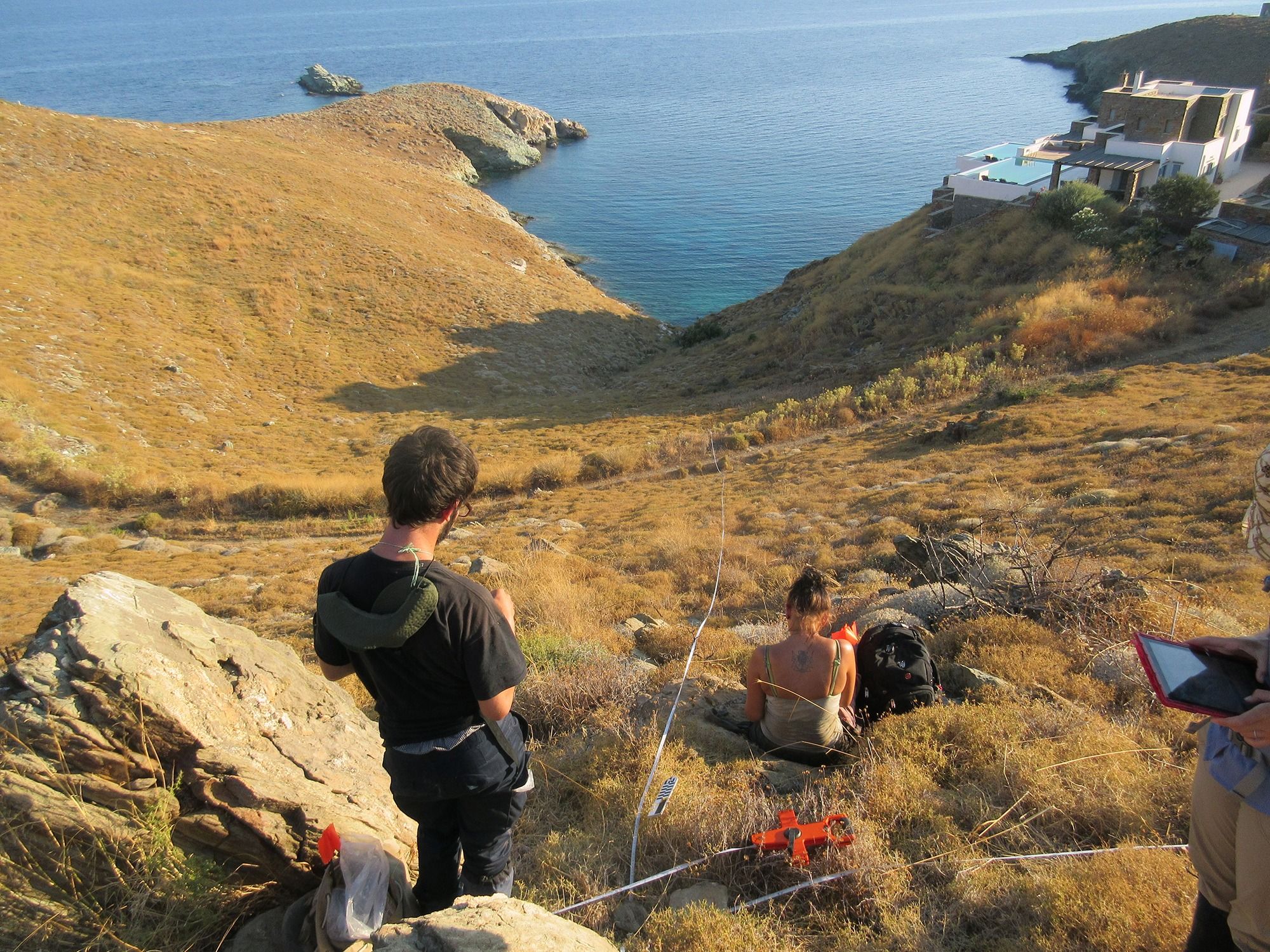
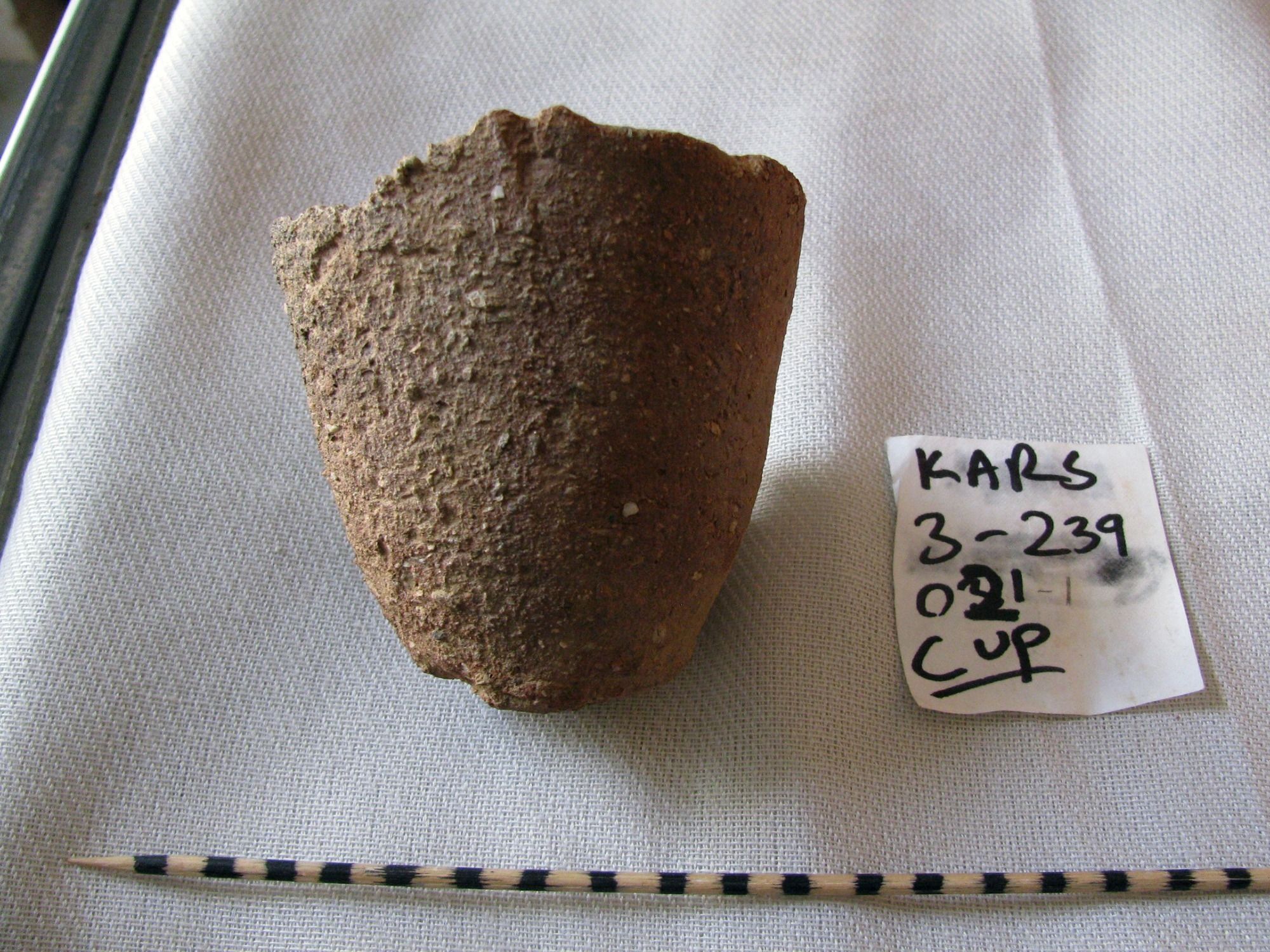
Since 2009, Dr. Joanne Murphy (left) has guided UNCG students like Michael Bell (second left) through six-week professional internships at an archaeological field school on the Greek island of Kea. See more photos on UNCG Research Flickr.
Digging In
Senior classical archaeology major Michael Bell can easily point to how opportunities for undergraduate research have changed the trajectory of his life.
He met Dr. Murphy on his second day of classes as a transfer student at UNCG. During a discussion of ancient graffiti, Bell recounted an instance of Greek mercenaries scrawling their identities and deeds into the stone of Abu Simbel, while fighting on behalf of sixth century BCE Egyptian pharaoh Psamtik II.
Murphy challenged Bell, asking for a short presentation on the subject at the next class. Though he was, he says, “filled with trepidation,” he successfully completed the assignment – and learned about the graffiti’s connection to “The Iliad” in the process.
Since then, Bell has traveled to Greece three times to conduct research. As a first-generation college student with financial need, Bell assumed he would not have the opportunity to study abroad, but he applied for and received an award through UNCG’s URSCO.
Using data collected by the Kea Archaeological Research Survey, Bell is analyzing the use of apicultural goods, like honey and beeswax, and metallurgical material on the Cycladic island of Kea – the earliest known site for metal production in the Aegean. He’s exploring prestige goods production and how they relate to social organization and economic priorities. Bell has presented his work at the Southern Conference Undergraduate Research Forum, as well as at UNCG’s Thomas Undergraduate Research and Creativity Expo.
He plans to apply for graduate programs in classical archaeology this fall, and credits hands-on research and mentorship as experiences that have developed him as a scholar and otherwise.
“The experience I gained in field work, research methods, experimental design, data collection and analysis, and presenting results has been instrumental in preparing me for my future academic endeavors – and in helping me to build confidence in my personal life,” says Bell.
“The opportunities undergraduate research has afforded me have allowed me to develop skills that go far outside the bounds of standard coursework.”
KNOWING WHAT YOU KNOW
One of the major challenges humanities graduates face is articulating how the skills they learned in their coursework make them desirable employees. It is that realization that led Nicole Hall in UNCG’s Career and Professional Development office and former Associate Professor Emily Levine to develop the Liberal Arts Advantage.
Imagine a student who has examined the major causes of the Holocaust in a history course, or traced the rise of capitalism across the globe for a political science course.
“Those students are presented with information. They have to analyze it, understand its origins – the why and the how,” says Hall. “If you translate those skills to the corporate or nonprofit sector, they really work well.”
The Liberal Arts Advantage provides training for faculty and students on the translatable value of the skills learned in humanities courses.
Participants can access online modules focused on skill articulation or attend professional development days. So far, more than 500 students have used the modules, while more than 300 students have taken advantage of the in-person opportunities.
The program also connects students with senior professionals who can speak about how their education in the liberal arts propelled them toward career success. Critical thinking and skills in collaboration and communication, says Hall, allow humanities graduates to move fairly easily across careers.
“We’ve had recruiters come, and these are the types of candidates they want,” she says. “They can easily size up a circumstance, a problem, a challenge. They can collaborate with others and communicate an outcome.”
“There is a long history of productive tension between two goals in education – learning for learning’s sake versus the imperative we have to prepare students for professional success and responsibility and leadership,” says Levine.
“In times of economic downturn or when pressures for students to find jobs are the greatest, you often see humanists on the defensive,” she observes. “They may feel resistant to learning for its own sake being encroached on by more vocational institutional goals.”
But Hall and Levine say the University doesn’t have to choose. “We believe it’s the mission of the institution – historically, and as well as today – to bring these two sides together.”
Humanities Corridor. North Carolina Central University and UNCG recently partnered to launch a Humanities Corridor that facilitates cross-institution research among students and faculty.
A NEW CONVERSATION
One of the newly funded faculty-student research collaborations will take place through a new course offering this fall: “Africans in the Greco-Roman World.”
“Or we could call it Greeks and Romans in the African world,” says UNCG Lloyd International Honors College Dean and historian Omar Ali, who will co-teach the course with assistant dean and classicist Rebecca Muich.
The course combines classical studies with history and African diaspora studies. The material counters the common impression that people who lived in and interacted with the Greco-Roman world were only Greek and Roman.
“They’ll get a real opportunity to deal with primary sources,” says Dr. Muich. “And in working with the classical world, you have to expand your idea of what primary sources are. You have to read for the gaps, as well as what is there. You have to understand your sources as containing biases and preconceived notions and read for that.”
The course’s primary sources will be curated by undergraduate research assistants Janelle Crubaugh and Denaisha Wortham – and made available online for wider use. Crubaugh is a history and international and global studies double major, while Wortham is double majoring in African American and African diaspora studies and sociology.
Some activities will spin off into community events. For a photography exhibition, the researchers will enlist the help of UNCG’s costume studio to construct their own Minerva helmet, which they will invite students and members of the community to try on.
“We want to bring the community into conversations that academics are having, and we want to generate the idea that we’re all Minerva,” says Dr. Ali. “When people think about classical studies, they think about people who are white, and they separate it from Africa. But it’s a disservice to see the Greeks and Romans as separate from the rest of the Mediterranean world.”
Dr. Cerise Glenn, director of UNCG’s African American and African Diaspora Studies Program, is one of several notable guest speakers for the project.
“We train for how to open up and begin a new conversation,” she says. “When we examine the African identity in the Greco-Roman world, we learn things from the myths and the narratives – who gets framed in and out? It opens up a conversation about race and identity. The way we re-tell stories, particularly in popular culture and media, shows us how we are still grappling with what we were in the past.”
Muich and Ali will guide students in learning about African figures from that world, such as Candace Amanirenas, a female Nubian warrior-queen who fought the Roman empire, and Septimius Severus, who worked his way up through to the army to become emperor of Rome, and St. Augustine of Hippo, who had a profound impact on Christianity.
“The Greco-Roman world was an incredibly diverse place. It’s very expansive geographically, extending from Iberia sometimes as far as India and very far south into northern Africa. Our work opens the conversation from Romans and Greeks to people around them,” says Muich.
“How did they participate in or challenge those institutions and how were they represented – there’s so much about representation and it begins in antiquity.”
Photo front to back: Ali, Muich, and Glenn
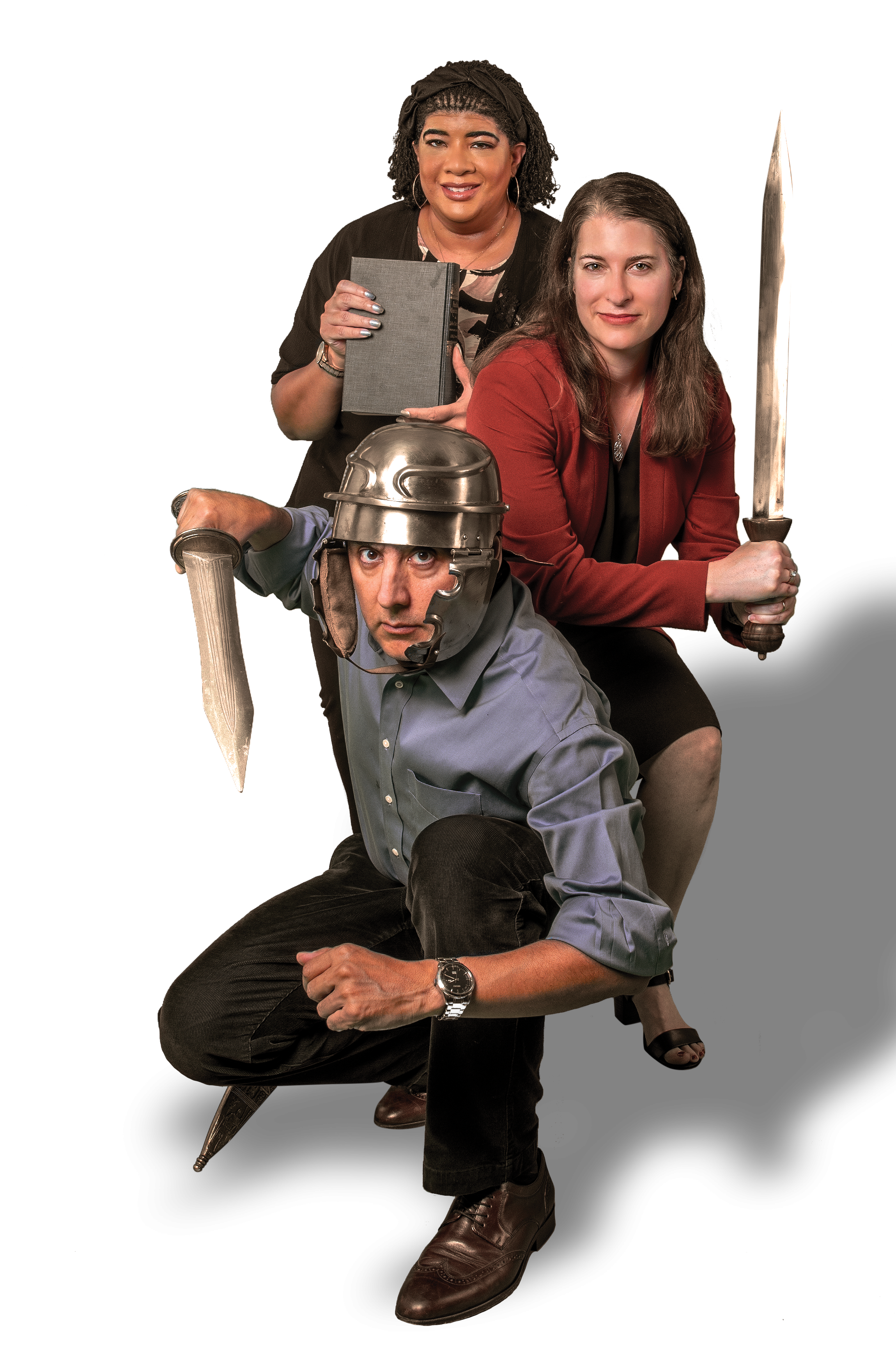
HUMANITIES FOR ALL
Public resource allocation, infrastructure – these are humanities questions, says Associate Professor of English Jen Feather.
“The humanities offer us the tools to think critically about where we put resources and how we make decisions about the communities we live in,” adds Women’s and Gender Studies Program Director and Associate Professor of History Lisa Levenstein. “Those are questions that determine what happens in our universities, in all disciplines, and in our world.”
Together, Dr. Feather and Dr. Levenstein are the co-founders of UNCG’s Humanities Network and Consortium, or HNAC, which they launched to connect humanities scholars, students, and the public. It’s about starting conversations that bridge gaps, they say, between individual fields of scholarship and between scholarship and public life.
Last year, HNAC worked with the New York-based Humanities Action Lab, to bring the “States of Incarceration” exhibition to Greensboro. UNCG scholars from multiple departments contributed to the exhibition, which focused on the United States prison system and its flaws and even included letters from 1920s chain-gang inmates in North Carolina.
UNCG students not only generated material for the exhibition – which took place at the International Civil Rights Center and Museum – but also organized public programs for the community about mass incarceration.
In the fall of 2020, HNAC will focus on issues of civic engagement, democracy, and voting rights, in honor of the 100th anniversary of the 19th Amendment.
The consortium’s slogan is “humanities for everyone.”
“We are countering the idea that the humanities are the province of the elite,” Levenstein explains. “We believe that everyone deserves and benefits from a strong engagement with the humanities. Those conversations are vital to our students, the public, and a flourishing democracy.”
HNAC sponsors and takes part in many events on campus and in the community, such as the Greensboro Bound literary festival and FrameWorks, which provides scholarly programming around UNCG theater productions. For each event, HNAC facilitators emphasize connecting the public with scholars and providing a forum where students can participate – and lead.
“Our students are thought leaders and changemakers, and as the next generation, they need to know how to have those conversations, how to participate in those conversations,” says Feather.
“We want to nurture the change-making skills of a broad range of students. And we’ll see them changing the world.”
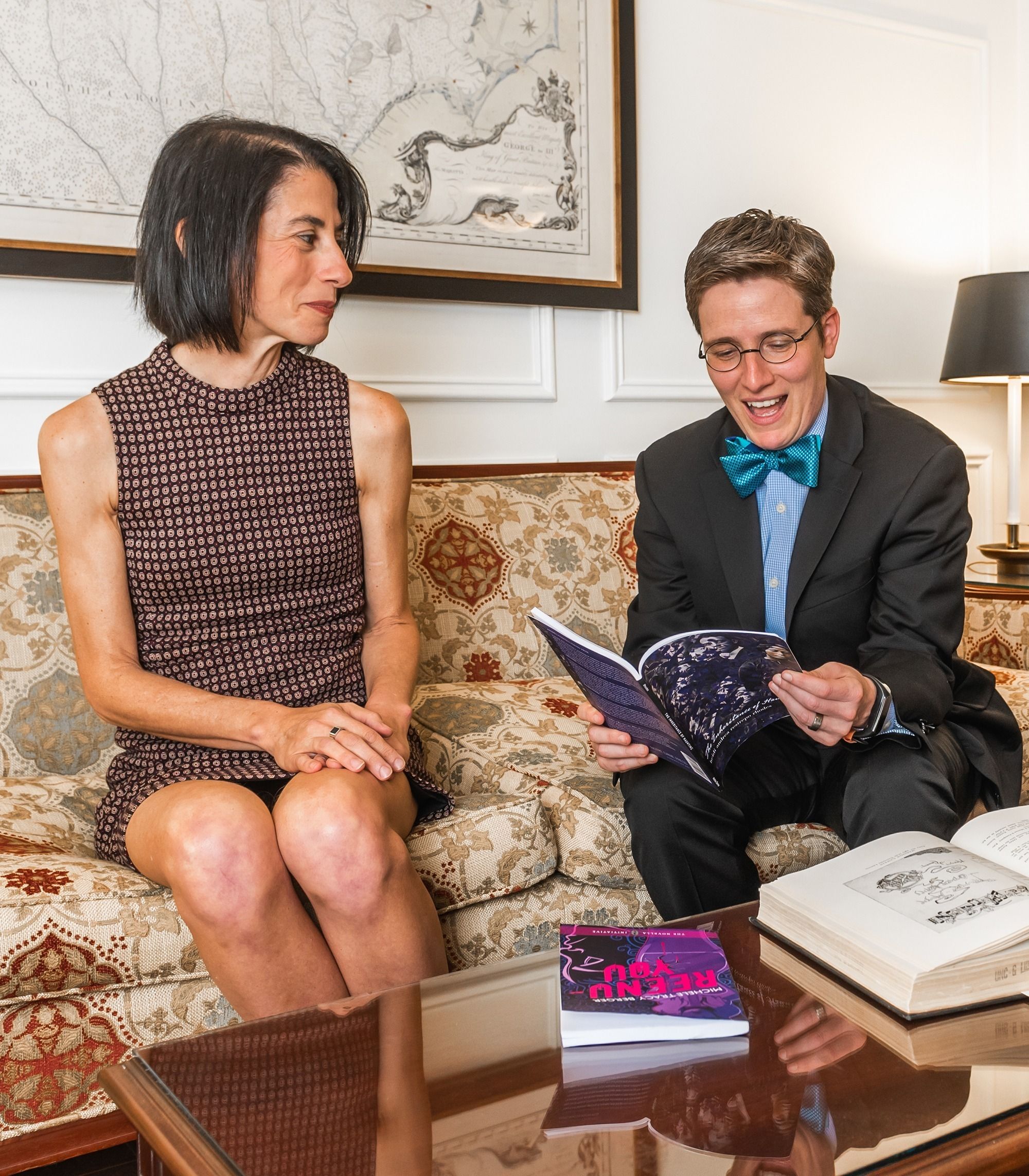
Literary Festival. Levenstein and Feather, left to right, discuss a Greensboro Bound panel on writing from a feminist perspective.